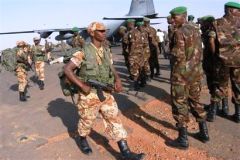Peacemaking proves African Union’s baptism of fire
By William Maclean
NAIROBI, Feb 17 (Reuters) – To its admirers, the African Union (AU) deserves respect for doing what no one else has even tried — deploying forces on the ground to end war in Darfur.

|
|
Rwandan troops greeted by Nigerian soldiers at El Fasher airport in Darfur, October 30, 2004. (Reuters). |
To its critics, the idealistic officials leading the young organisation are handicapped by member governments too poor, too cynical or too attracted by the spoils of war to keep the peace.
But friends and foes alike agree that with more funds and political support the AU could one day become Africa’s peacekeeper, a role that could see it take on even tougher challenges in Somalia and Democratic Republic of Congo.
“We have our shortcomings but we have the political will. And a lot of the criticism that we get on Darfur involves double standards,” says AU Commission spokesman Adam Thiam.
His remarks reflect Africa’s profound mistrust of promises made by Western powers after the 1994 Rwandan genocide that they would never allow such a crime to be repeated.
“Africa now realises those pledges are hollow, that only Africans will send troops to stop bloodshed on its continent,” wrote Nancy Sodeburg of the International Crisis Group (ICG) think tank.
HIGH IDEALS
“The AU is much like the U.N. in 1945 — there are high ideals, but no functioning mechanisms to realise them.”
While Africa’s woes take up more than half the agenda time of the U.N. Security Council in New York, the top body responsible for international peace and security is proving less and less inclined to send peace missions to the continent.
“Since the Cold War, non-Africans have preferred to delegate peacemaking to African institutions. They present this as ‘African solutions to African problems’. But it is a sign of Africa’s strategic marginalisation,” said Klaas van Walraven, who studies peacekeeping at the Netherlands’ Leiden University.
There is no doubt about the urgency of the peacemaking role the AU set itself when it was formed in 2002 out of the defunct Organisation of African Unity (OAU), an ineffectual Cold War-era body starved of funds and long criticised as a dictators’ club.
U.N. Secretary General Kofi Annan called for immediate action on Wednesday to end what he termed a near hell-on-earth in Darfur, the western Sudanese region where the U.N. estimates a two-year conflict has killed at least 70,000 people.
The AU has some 1,400 troops in Darfur and expects the force eventually to grow to more than 3,000 — still a tiny number of soldiers to stem killings in an area the size of France.
Some observers feel the AU’s failure to deploy more men reflects a lack of diplomatic muscle in tackling governments suspected of killing their own people. Others are optimistic.
“In the old days one leader would tell another: ‘You leave my victims to me and I’ll leave your victims to you’,” said veteran AU-watcher Abdul Raheem Tajudeen, a Nigerian.
“Now, after three decades of shamelessness, there is a sense of shame in Africa. We are slowly building collective security.”
SHARP END
Optimists point to the AU’s willingness just this month to condemn the unconstitutional transfer of power in Togo following the death of old-style veteran president Gnassingbe Eyadema.
And the AU and former OAU can trumpet the relative success of past diplomacy in the Democratic Republic of Congo, Burundi, the Comoros, Ethiopia and Eritrea and its help in ending war in southern Sudan.
But the AU is still taking baby steps at peacekeeping’s sharp end, where troops have to be deployed and national sovereignty must be challenged in order to protect civilian lives.
To some, the AU is too timid to make a difference in Darfur.
Some say the Sudanese government’s insistence on AU rather than Western peacekeepers shows a cynical desire to work with a force lacking the tools to spot its alleged role in violence.
“In Darfur the AU is faced with a malignant ruling elite which has been willing to destroy entire regions and communities in the course of its own power struggles,” said van Walraven.
Daniel Bach, a French political scientist who studies Africa, said a truly new AU would have summoned the will and capacity to intervene unilaterally and robustly in Darfur.
“How can the AU handle access to Darfur by coordinating with the very people largely responsible for the crisis?” he said.
Officials admit the time-consuming Darfur operation has set back progress on plans to develop a 15,000-strong African Standby Force to help keep the peace. The AU had planned to set up the ASF and deploy it at five regional bases by 2005, expanding it to a continental force by 2010.
Money is a big problem. The European Union funds most peace operations. But analysts say the key issue is not lack of money as such — the AU budget is tiny compared to many U.N. aid programmes — but African states’ misplaced spending priorities.
Of a $200 million peace fund planned for 2004-07, only $1.6 million has as yet been paid in by AU member states.
“There is a sort of mystical approach to the AU as the solution to all African problems and an extraordinary renaissance of pan-Africanism as a project … but this is almost totally dependent on support from outside Africa,” said Bach.
